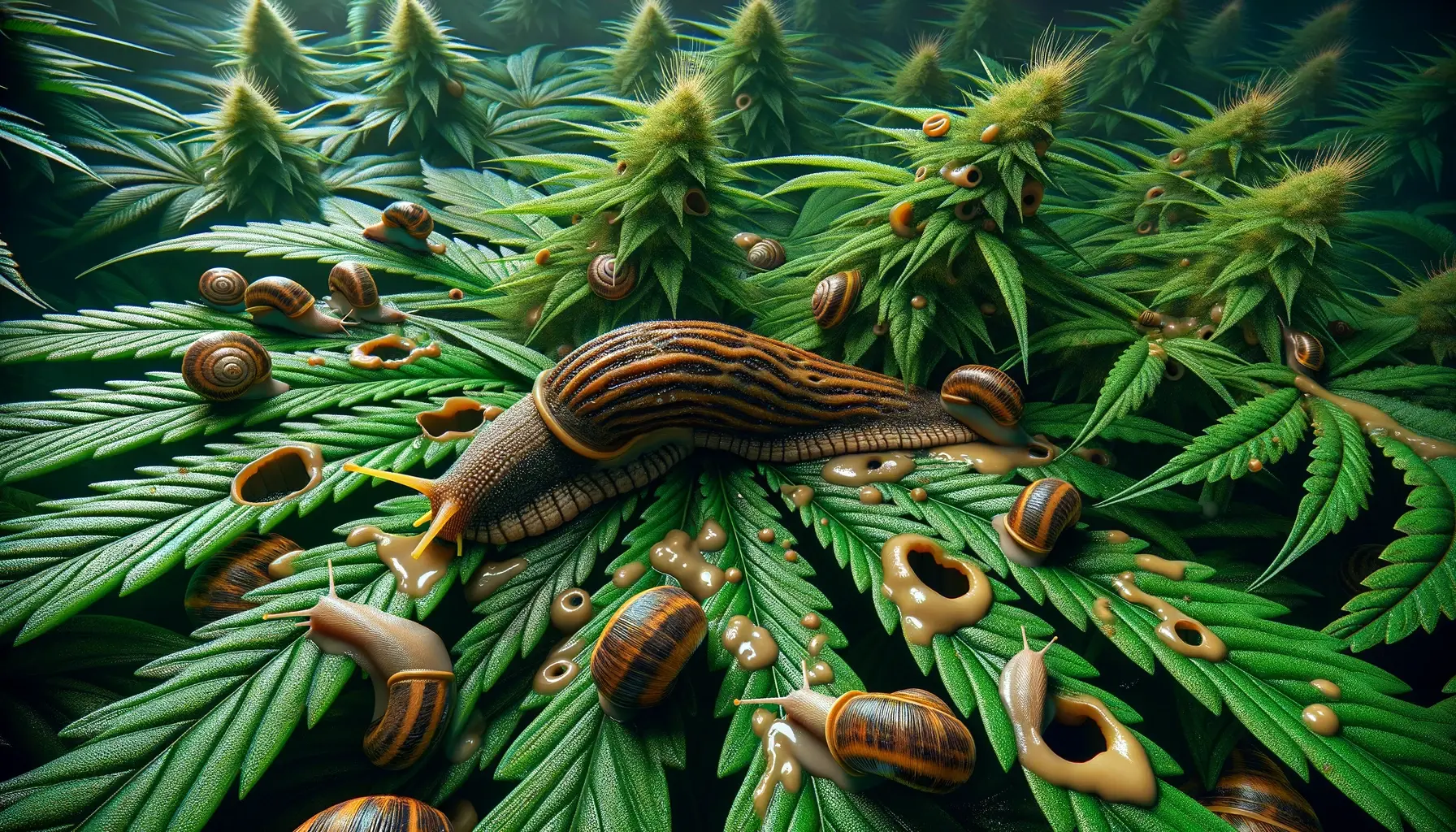Combatting pests is a common challenge for marijuana cultivators, especially when dealing with slugs and snails. These mollusks are notably troublesome as they feast on the leaves, leaving behind holes and slimy trails. A flourishing cannabis garden can quickly turn into a buffet for these pests, making it imperative to take decisive action.
Understanding the Adversary
Before diving into eradication strategies, it’s vital to understand the biology and behavior of slugs and snails to tackle the problem effectively.
- Biology: Slugs and snails are gastropods, possessing a soft, unsegmented body that moves via a muscular ‘foot’. They thrive in moist, humid conditions which are often prevalent in cannabis gardens.
- Behavior: They are primarily nocturnal creatures, hiding in dark, damp spots during the day and emerging at night to feast on your plants.

Preventative Measures
Initiating preventative measures can significantly reduce the chances of a slug and snail infestation.
- Maintain Dry Conditions: Ensure the garden has good drainage and water your plants early in the day to allow the soil to dry before nightfall.
- Remove Debris: Regularly clear away debris, leaves, and other material that provides hiding spots for slugs and snails.
- Barriers: Create barriers using materials uncomfortable for slugs and snails to cross, like crushed eggshells, diatomaceous earth, or copper tape.

Organic Remedies
If you prefer an organic approach to pest control, consider these remedies:
- Beer Traps: Fill shallow dishes with beer and place them around the garden. The yeast attracts slugs and snails, leading them to fall into the traps and drown.
- Nematodes: Introducing beneficial nematodes to the soil can help control slug populations as they parasitize and kill these pests.
- Hand Picking: Though labor-intensive, hand-picking slugs and snails during their active hours can be an effective control method.
Insights from Seasoned Cultivators
Experienced growers often have a wealth of knowledge when it comes to pest control. Engage with the community, participate in forums, and read articles from reputable sources to gather valuable insights and practical tips to keep your cannabis garden slug and snail-free.
Chemical Solutions
While organic methods are preferable, severe infestations may necessitate the use of chemical solutions. Here are some options:
- Iron Phosphate: Available in pellet form, iron phosphate is a safer alternative that causes slugs and snails to stop feeding, leading to their demise.
- Metaldehyde: This chemical is highly effective but should be used cautiously as it can be harmful to pets and other non-target organisms.
Biological Control
Introducing natural predators into your garden can provide a sustainable solution to slug and snail problems.
- Predatory Beetles: Certain beetle species, such as ground beetles, are natural predators of slugs and snails and can help keep their population in check.
- Birds: Encouraging birds to visit your garden by installing bird feeders and baths can also help control slug and snail populations as they are natural predators.
Creating a Resilient Garden Ecosystem
Building a balanced garden ecosystem can significantly reduce the chances of pest infestations.
- Crop Diversity: Planting a diverse range of crops can deter pests and prevent infestations. Companion planting with species that repel slugs and snails, like garlic or chives, can be beneficial.
- Soil Health: Maintaining healthy, well-draining soil with plenty of organic matter can deter slugs and snails and promote stronger, more resilient plants.
Monitoring and Regular Maintenance
Regular monitoring and maintenance are key to preventing and managing slug and snail infestations.
- Regular Inspections: Conduct thorough inspections, especially during damp, humid conditions, and take immediate action when signs of infestation are spotted.
- Maintenance: Keeping the garden tidy, removing debris, and maintaining dry conditions as much as possible will go a long way in preventing infestations.
Combatting slugs and snails in your cannabis garden requires a multi-faceted approach. By understanding the adversary, taking preventative measures, exploring both organic and chemical solutions, and fostering a balanced garden ecosystem, you can significantly mitigate the risk of infestation and ensure a thriving, healthy garden.
